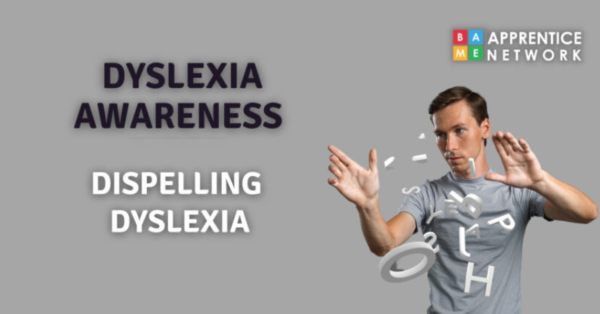The BAME Apprentice Network is helping to promote greater awareness of dyslexia and has created a Dispelling Dyslexia Guide in the hope of eliminating some of the misconceptions around it.
The BAME Apprentice Network is a Community of Black, Asian, Minority, Ethnic (BAME) Apprentices that aims to change the landscape of apprenticeships by empowering apprentices to develop personally and professionally, as well as championing change within the Further Education (FE) sector.
The following article also discusses what dyslexia is, what it means and what can be done to support people who have dyslexia.
What is Dyslexia?
Dyslexia is a language-based learning difficulty that can cause problems with reading, writing, and spelling. It is a lifelong condition, dyslexia that can present challenges regarding learning and written communication.
In the UK, around 10% of the population have dyslexia. Despite this, dyslexia is often misunderstood in society due to a lack of awareness and education about the condition, leading to many misconceptions and stereotypes surrounding it.
What are the Signs of Dyslexia?
It’s important to remember that dyslexia varies greatly from person to person. Signs of dyslexia usually start during childhood but can be misdiagnosed or go undiagnosed completely throughout a person’s lifetime as the symptoms are not always obvious. The severity of dyslexia also differs vastly from person to person.
Depending on their condition, a person with dyslexia may:
- Read and write very slowly
- Confuse the order of letters in words
- Put letters the wrong way round (such as writing “b” instead of “d”)
- Have poor or inconsistent spelling
- Understand information when told verbally, but have difficulty with information that is written down
- Find it hard to carry out a sequence of directions
- Struggle with planning and organisation.
Dyslexic People are Often Very Creative and Great at Problem Solving
Dyslexic usually see the bigger picture in a situation which means that they are often people are often very creative, great problem solvers. Notable dyslexic people include Albert Einstein, Agatha Christie, Steven Spielberg, Muhammad Ali, Jennifer Aniston, Richard Branson, Whoopi Goldberg and Walt Disney.
Dyslexia is Not a Learning Disability
Dyslexia is not a learning disability as it has no effect on intelligence. Many dyslexic individuals are highly intelligent,and will frequently outperform their peers when given the right support.
Dyslexia is Not a Medical Condition
Dyslexia is not a disease or classed as a medical condition, and thus cannot be “cured” like one using medication or similar treatment. However, in some cases the effects of dyslexia can be mitigated to an extent using different and more effective approaches to reading and writing, allowing an individual to overcome problems at school, work, or in life in general.
The Exact Cause of Dyslexia is Unknown
Dyslexia is usually present from birth and appears to run in families (although it can also be caused as a result of a brain injury or illness that impedes literacy skills). Signs of dyslexia usually start during childhood but can be misdiagnosed or go undiagnosed completely throughout a person’s lifetime as the symptoms are not always obvious. The severity of dyslexia also differs vastly from person to person.
How to Support Dyslexic Colleagues
Read the full article by The BAME Apprentice Network at to find out more about the following
- Are there different kinds of Dyslexia?
- How does Dyslexia affect people?
- How to Support Dyslexic Colleagues at Work?
Further Information
Read and share the Dispelling Dyslexia Guide by The BAME Apprentice Network: https://bameapprenticenetwork.com/wp-content/uploads/2021/10/Dyslexia-Guide.pdf
Visit The British Dyslexia Association: https://www.bdadyslexia.org.uk







